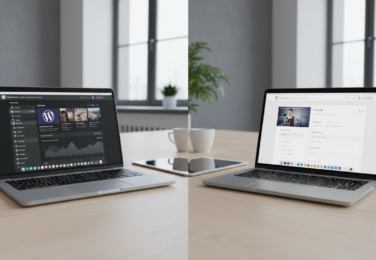Ensuring Website Security in WordPress: Safeguarding Your Online Presence

Table of Content
In the fast-paced digital world, website security has become a paramount concern for businesses and individuals alike. WordPress, being one of the most popular content management systems (CMS), is a prime target for cybercriminals. In this blog post, we will explore essential measures to ensure the security of your WordPress website, protecting it from potential threats and safeguarding your online presence.
- Keep Your WordPress Core, Themes, and Plugins Updated:
Regularly updating your WordPress installation, themes, and plugins is crucial for maintaining website security. Developers frequently release updates to address vulnerabilities and enhance security features. By staying up to date, you minimize the risk of exploitation and ensure that your website benefits from the latest security patches. - Use Strong and Unique Passwords:
The importance of strong and unique passwords cannot be overstated. Avoid using easily guessable or commonly used passwords. Instead, opt for complex combinations of uppercase and lowercase letters, numbers, and special characters. Additionally, consider using a reliable password manager to securely store your passwords. - Implement Two-Factor Authentication (2FA):
Two-factor authentication adds an extra layer of security to your WordPress login process. By requiring a second verification step, such as a unique code sent to your mobile device or email, 2FA significantly reduces the chances of unauthorized access even if your password is compromised. Utilize reputable 2FA plugins available in the WordPress plugin repository to implement this essential security measure. - Choose Trusted Themes and Plugins:
When selecting themes and plugins for your WordPress website, ensure they are sourced from reputable developers and regularly updated. Themes and plugins from trustworthy sources are more likely to undergo rigorous security testing and receive timely security patches. Avoid using pirated or outdated themes/plugins, as they can be vulnerable to exploits and compromise your website’s security. - Regularly Backup Your Website:
Regular backups are an essential aspect of website security. In the event of a security breach or data loss, having recent backups allows you to restore your website to a previously secure state. Consider using reliable backup plugins or services that offer automated backups and off-site storage. Additionally, test the restoration process periodically to ensure the backups are functioning correctly. - Install Security Plugins:
WordPress provides various security plugins that can bolster your website’s defense against threats. These plugins offer features like malware scanning, firewall protection, and login security enhancements. Research and select a reputable security plugin that aligns with your specific security needs, and configure it properly to fortify your website’s defenses. - Limit Login Attempts:
Brute-force attacks, where malicious actors attempt to gain access by repeatedly guessing usernames and passwords, are common. Implementing login attempt limitations can thwart these attacks. Several plugins are available to restrict the number of login attempts, temporarily block IP addresses, or introduce CAPTCHA challenges to deter unauthorized access. - Secure File Permissions and Directories:
Ensure that file and directory permissions are set correctly on your WordPress installation. Restrict write permissions to essential files and directories, preventing unauthorized modification or execution of malicious scripts. Regularly review and update file permissions as required to maintain the security of your website.
Website security is a critical aspect of managing a WordPress website. By following these best practices, you can significantly enhance the security of your WordPress installation, protecting it from potential threats and ensuring the integrity of your online presence. Remember, proactive measures such as regular updates, strong passwords, backup routines, and the use of reputable plugins are key to maintaining a secure WordPress website. Stay vigilant, implement security measures diligently, and enjoy a safe and secure online experience with your WordPress-powered website.










